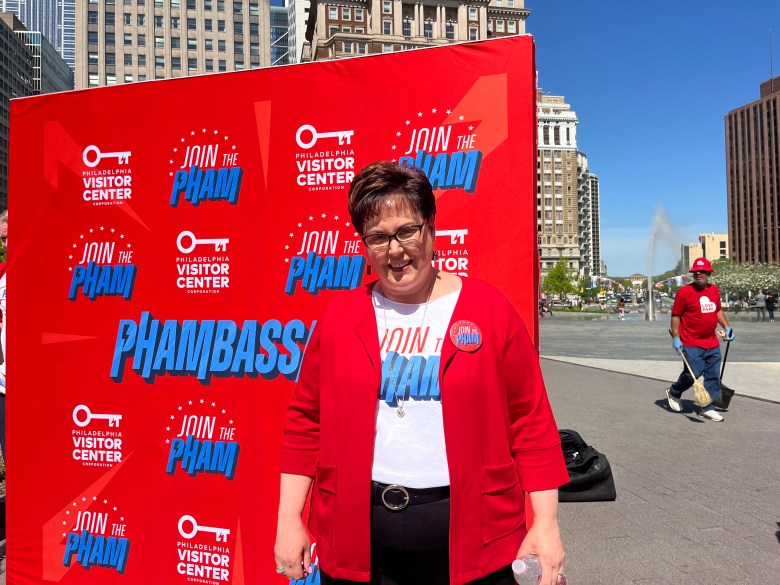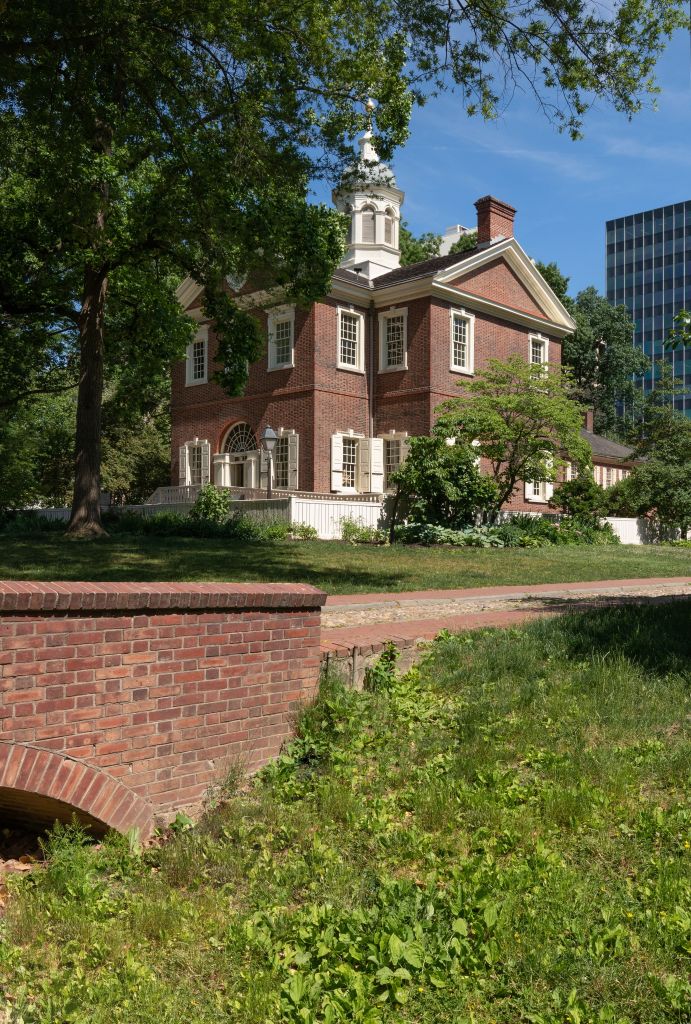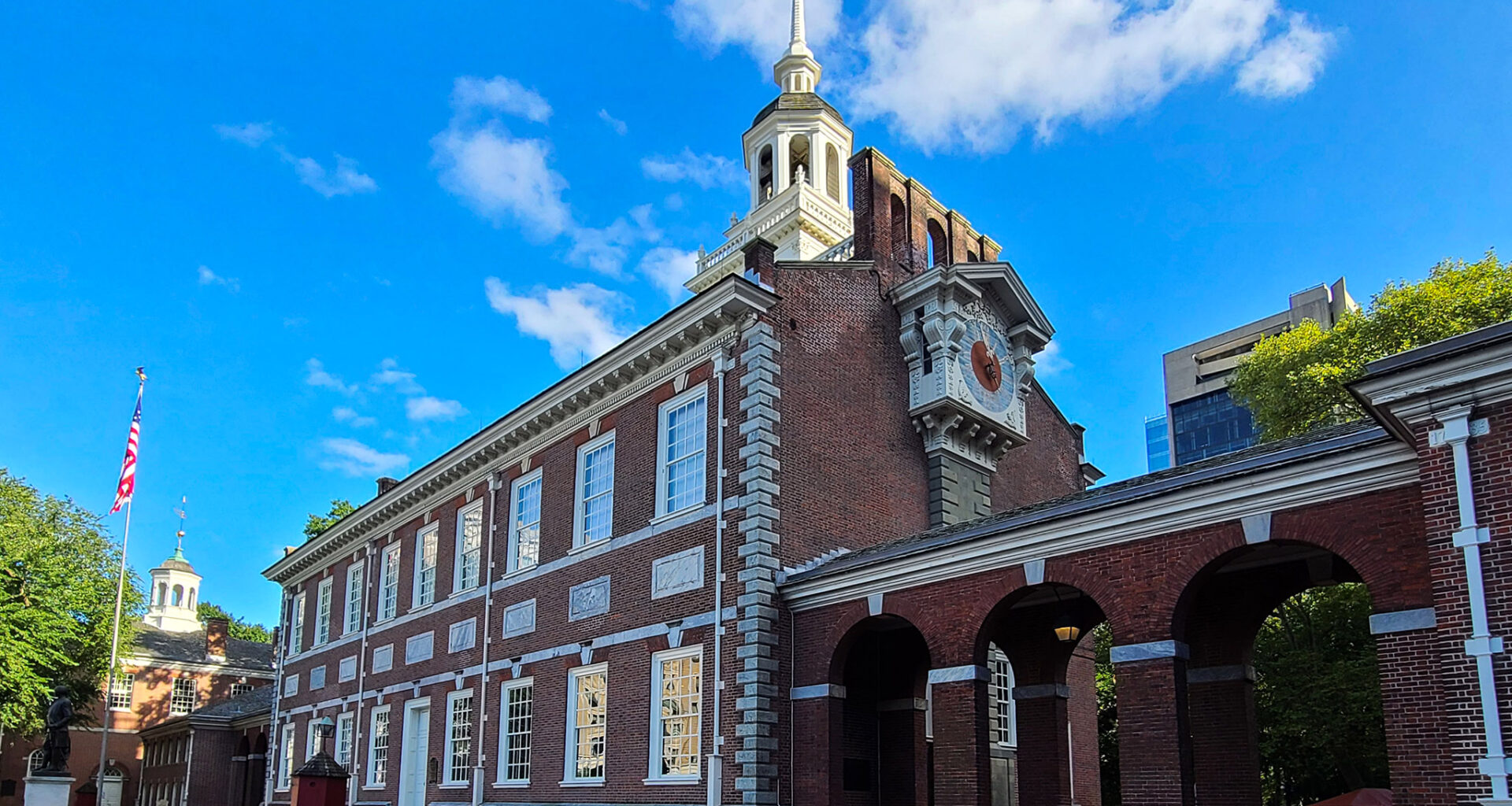For Philadelphia, next year is everything.
July 4, 2026, the 250th anniversary of the signing of the Declaration of Independence, will culminate years of planning, organizing, fundraising and hopes for a series of events that will see Philly serve as a huge tourist destination and focal point for a national celebration.
In an obvious understatement, Michael Newmuis, the city’s 2026 director, said, “This will be an exciting year.”
This isn’t Philly’s first birthday rodeo. In fact, this is the fourth time it’s been called upon to host a national birthday party. The city hosted the country’s Centennial in 1876 (by most accounts a success), the 150th anniversary in 1926 (by most accounts a great failure), and the Bicentennial in 1976 (a missed opportunity or a modest success, depending on whom you ask). After next year, the city will have to wait until 2076 for another crack at the nation’s milestone birthday party.
Newmuis, a University of Pennsylvania graduate who majored in cognitive science, spoke several times to Billy Penn about next year’s plans. He was never ruffled by questions ranging from celebrating men who owned slaves to politicians wanting to get their names in the media (and funds to operate the events) to fixing up the city to make it presentable to the visitors the city and region seek to attract.
 2026 Director Michael Newmuis attends the State of University City 2024 at World Cafe Live. (Emma Lee/WHYY)
2026 Director Michael Newmuis attends the State of University City 2024 at World Cafe Live. (Emma Lee/WHYY)
“I think a major goal of this project will be to create unifying experiences that set a bold new narrative for who we are as a city and as a country,” he said. “The things that Philadelphia is offering through 2026 are precisely those which unite us, right?”
Newmuis, in his role, serves as uniter in chief, tasked with raising private funds for the events, and dealing with local, state and federal officials, as well as foreign governments. He, and many other government officials and nonprofit leaders, say they have been cooperating to make sure the project succeeds.
The project doesn’t lack for money. According to Newmuis, Mayor Cherelle Parker’s 2026 budget allocates about $100 million for capital improvements, safety measures, support of organizations and marketing efforts, among other things.
“Philadelphia has a proud legacy of hosting major events, and we’re ready to raise the bar for America’s 250th,” Mayor Parker said in a statement. “With our proven track record, passionate partners and a deep love for our city, we’re creating unforgettable experiences that bring people together.”
High-profile sporting events, including the 2026 FIFA World Cup and the 2026 Major League Baseball All-Star Game, will occur in Philadelphia. The soccer matches are expected to draw about 500,000 visitors from around the world during June and July of next year.
Neighborhood engagement
Events are being planned from January 1 to December 31. One of the key strategies, said Newmuis and others, is getting communities throughout the city and region who are not normally included in such celebrations to be participants.
Max Weisman, communications director for at-large Philadelphia City Councilman Isaiah Thomas, said people involved with the project have been going into city neighborhoods to tell residents that the city and other participating groups want them to be involved in and benefit from the 250th celebrations.
“We also want to spread the dollars around to try to encourage people to try a different neighborhood they’ve never been to before,” Weisman said. “So it’s this balancing act of, we know that Old City and Center City are going get a lot of the focus from our tourists and from our events and from our sites, but also trying to see what we can do to, encourage someone to see historic sites in Germantown and in West Philly and across the city.”
The Philadelphia Visitor’s Center has a different tack on engaging residents, having launched a volunteer program — “Phambassadors” — earlier this year.
 Kathryn Ott Lovell, President and CEO of the Philadelphia Visitor Center Corporation, poses in front of the Phambassador program sign in April 2025. (Violet Comber-Wilen/Billy Penn)
Kathryn Ott Lovell, President and CEO of the Philadelphia Visitor Center Corporation, poses in front of the Phambassador program sign in April 2025. (Violet Comber-Wilen/Billy Penn)
The Pennsylvania state government is also involved; Governor Josh Shapiro has budgeted $65 million to promote the 250th, and plans are being made to hold events in Lancaster, Valley Forge, and in the surrounding suburban counties.
The Philadelphia Funders Collaborative for the Semiquincentennial formed in 2023, and its members are providing substantial funding for the yearlong celebration.
The group includes a lot of the region’s charitable heavy hitters — The William Penn Foundation, Connelly Foundation, Neubauer Family Foundation, Pew Charitable Trusts, Hamilton Family Charitable Trust, and Comcast. Through May, they have given out over $14 million to dozens of organizations. Many others are seeking, cooperatively, a piece of that financial pie, including the Independence Historical Trust (IHT).
“I think we’re all in this together and we recognize that and we just want to do what’s best for the city,” said Jonathan Burton, director of development for IHT.
“There are a lot of cooks in this kitchen,” said Kathryn Ott Lovell, CEO of the Philadelphia Visitors Center for eight years who was appointed earlier this year to lead Phila 250, a nonprofit focused on the 250th celebration.
While the kitchen is crowded, she said there has been very little grandstanding or ego.
“It’s 100 percent, 150 percent collaborative, there’s no politics involved, and I can’t believe I’m saying that, that is not at all kidding. Everybody understands what this moment is, and committed to it,” Ott Lovell said. “Thank God we don’t have a situation like in previous celebrations — 1926, 1976.”
“It’s a very different city now, thank God. We’ve come such a long way, and we’ve grown up a lot, we matured.
“We did take a hit during covid [to the] tourism industry, and this feels very redemptive to me, a redemptive opportunity or restorative opportunity for us as a city,” she said.
“I think we’re all in this together and we recognize that and we just want to do what’s best for the city,” Burton said. “I think Harry Truman said it’s amazing how many things you can accomplish if you don’t care who gets the credit. And it’s true.”
Cradles of liberty
As the birthplace of America, Philly has a lot of locations that played important roles. Many of them have been preparing for their star turn in 2026.
Carpenters’ Hall, site of the First Continental Congress in 1774 (it offered a yearlong set of programs to celebrate the 250th anniversary of that gathering), will again be active next year.
“We’re still finalizing the specifics, but we will be commemorating the 250th anniversary of the Pennsylvania Provincial Conference with a whole series of programs and activities,” said Michael Norris, executive director of Carpenters’ Hall. “The conference was a major milestone in the state’s history, and Pennsylvania’s first constitution was authorized.”
 View of Carpenters’ Hall in Philadelphia. (Image courtesy Carpenters Hall)
View of Carpenters’ Hall in Philadelphia. (Image courtesy Carpenters Hall)
One of the celebration’s largest projects inside Philadelphia’s national park is the restoration of the First Bank of the United States building, which opened in 1797 at 120 South 3rd Street, now across the street from the Museum of the American Revolution.
Burton said the project was financed by a public-private partnership. In June 2023, Independence National Historical Park received funding through the Great American Outdoors Act’s Legacy Restoration Fund to restore the building. The IHT Trust, he said, raised more than $4 million to support architectural plans, exhibit designs, project management and other costs. The appropriation from the feds was $30.1 million.
Christina Carter, of John Milner Architects, was the chief architect on the project.
“First Bank has undergone numerous changes over the centuries and is an interesting reflection of the 18th century on the exterior but the early 20th century on the interior,” said Carter, whose firm has worked to restore more than 100 National Historic Landmarks. “We found it challenging and enjoyable to work with these various architectural features, while discreetly integrating modern requirements.”
Election changed some things
The Trump administration’s efforts to curb federal spending have impacted the celebrations. Weisman said some federal funding was cut, and he has worked closely with Burton to find support and keep projects on track.
Burton, sitting on a bench in Benjamin Rush Garden on a recent afternoon, said seeing the visitors to the city made the payoff clear.
“I mean, it’s our history, it’s our city,” Burton said. “If I can help our city make sure it promotes itself in a constructive way and you get to share the history of our country, of our city, to visitors or even to residents or people who just moved here … it’s an honor.”
Beyond the impact of cuts, the planning for the 250th is happening against a background of shifting policy and Americans quarreling over the facts and meaning of history. A March issue of The New Yorker magazine had a cover with James Madison, Ben Franklin and Thomas Jefferson carrying boxes containing personal items as if they were fired, a reference to recent cuts of federal workers and also of the reassessment of the country’s white founding fathers.
R. Scott Stephenson, president and CEO of the Museum of the American Revolution, is acutely aware that these historical shifts and countershifts affect the reading of the American story.
“I think another problem we have to confront is many people assume it is a story that isn’t relevant for them, and that includes people who think nothing happened before they were born, but it also includes some communities that have traditionally been left out of the story,” Stephenson said. “I think we have to be very proactive in this outreach, we have to work very hard to get somebody through the door.”
The museum includes an exhibit on women’s suffrage. “While sometimes the revolution is critiqued for being conservative, for all the things that it didn’t do, there was a revolutionary promise from the very beginning,” Stevenson said. “Places like New Jersey, where suffrage was broader than we’re led to believe, where free people of color could vote, where women could vote, it’s a good reminder.”
Philadelphia, Stephenson said, is a central part of the story about free Black people in the early days of the republic. In the country’s first census in 1790, Philadelphia had the largest population of free Black people in the country, and the city was a center of the abolition movement.
A confident team
Even with all the challenges, Angela Val, president and CEO of Visit Philadelphia, has no doubts what will happen in 2026.
“I know it will be a success. Philadelphia does large events really well. We have a very good history around larger events, whether it’s the Republican National Convention, the Democratic National Convention, the NFL Draft, the Pope’s visit,” she said. “We’ve been on the world stage quite a few times, but in 2026, Philadelphia has a unique opportunity [as] the birthplace of the country and the birthplace of modern day democracy.”
Visit Philly began working on a national marketing campaign to promote the events of 2026 about three years ago. The campaign starts this summer and runs through 2026. The campaign is centered on Philadelphia, but includes other parts of the state as well.
“We’ll make sure that 2026 is a success for Philadelphia, but also for the state of Pennsylvania,” she said.
Councilman Isaiah Thomas has been involved in the planning. He too is confident everything will go off well, citing an example every Philadelphian is aware of.
“If our Eagles’ Super Bowl victory and parade taught us anything,” he said, “when Philly celebrates, the world joins in — and we did, and will continue to do so in a way that is safe, fun and boosts the economy.”’
Like Newmuis and others, Thomas believes “2026 will be an overwhelming success. The events are being planned and funded, and tourists from across America and the globe are making plans to join in on the fun. We are working to plan this celebration in a way that is inclusive, that represents every neighborhood in the city, and provides growth opportunities for Philly businesses.”
